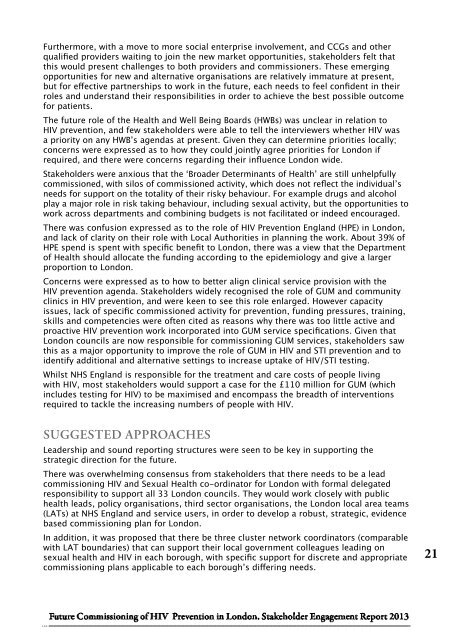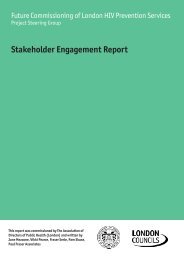Stakeholder Engagement Report - London Councils
Stakeholder Engagement Report - London Councils
Stakeholder Engagement Report - London Councils
Create successful ePaper yourself
Turn your PDF publications into a flip-book with our unique Google optimized e-Paper software.
Furthermore, with a move to more social enterprise involvement, and CCGs and other<br />
qualified providers waiting to join the new market opportunities, stakeholders felt that<br />
this would present challenges to both providers and commissioners. These emerging<br />
opportunities for new and alternative organisations are relatively immature at present,<br />
but for effective partnerships to work in the future, each needs to feel confident in their<br />
roles and understand their responsibilities in order to achieve the best possible outcome<br />
for patients.<br />
The future role of the Health and Well Being Boards (HWBs) was unclear in relation to<br />
HIV prevention, and few stakeholders were able to tell the interviewers whether HIV was<br />
a priority on any HWB’s agendas at present. Given they can determine priorities locally;<br />
concerns were expressed as to how they could jointly agree priorities for <strong>London</strong> if<br />
required, and there were concerns regarding their influence <strong>London</strong> wide.<br />
<strong>Stakeholder</strong>s were anxious that the ‘Broader Determinants of Health’ are still unhelpfully<br />
commissioned, with silos of commissioned activity, which does not reflect the individual’s<br />
needs for support on the totality of their risky behaviour. For example drugs and alcohol<br />
play a major role in risk taking behaviour, including sexual activity, but the opportunities to<br />
work across departments and combining budgets is not facilitated or indeed encouraged.<br />
There was confusion expressed as to the role of HIV Prevention England (HPE) in <strong>London</strong>,<br />
and lack of clarity on their role with Local Authorities in planning the work. About 39% of<br />
HPE spend is spent with specific benefit to <strong>London</strong>, there was a view that the Department<br />
of Health should allocate the funding according to the epidemiology and give a larger<br />
proportion to <strong>London</strong>.<br />
Concerns were expressed as to how to better align clinical service provision with the<br />
HIV prevention agenda. <strong>Stakeholder</strong>s widely recognised the role of GUM and community<br />
clinics in HIV prevention, and were keen to see this role enlarged. However capacity<br />
issues, lack of specific commissioned activity for prevention, funding pressures, training,<br />
skills and competencies were often cited as reasons why there was too little active and<br />
proactive HIV prevention work incorporated into GUM service specifications. Given that<br />
<strong>London</strong> councils are now responsible for commissioning GUM services, stakeholders saw<br />
this as a major opportunity to improve the role of GUM in HIV and STI prevention and to<br />
identify additional and alternative settings to increase uptake of HIV/STI testing.<br />
Whilst NHS England is responsible for the treatment and care costs of people living<br />
with HIV, most stakeholders would support a case for the £110 million for GUM (which<br />
includes testing for HIV) to be maximised and encompass the breadth of interventions<br />
required to tackle the increasing numbers of people with HIV.<br />
Suggested approaches<br />
Leadership and sound reporting structures were seen to be key in supporting the<br />
strategic direction for the future.<br />
There was overwhelming consensus from stakeholders that there needs to be a lead<br />
commissioning HIV and Sexual Health co-ordinator for <strong>London</strong> with formal delegated<br />
responsibility to support all 33 <strong>London</strong> councils. They would work closely with public<br />
health leads, policy organisations, third sector organisations, the <strong>London</strong> local area teams<br />
(LATs) at NHS England and service users, in order to develop a robust, strategic, evidence<br />
based commissioning plan for <strong>London</strong>.<br />
In addition, it was proposed that there be three cluster network coordinators (comparable<br />
with LAT boundaries) that can support their local government colleagues leading on<br />
sexual health and HIV in each borough, with specific support for discrete and appropriate<br />
commissioning plans applicable to each borough’s differing needs.<br />
21




